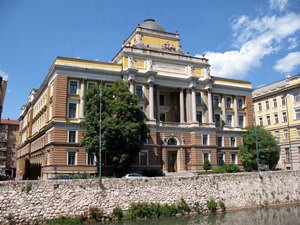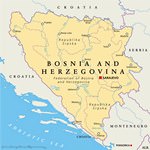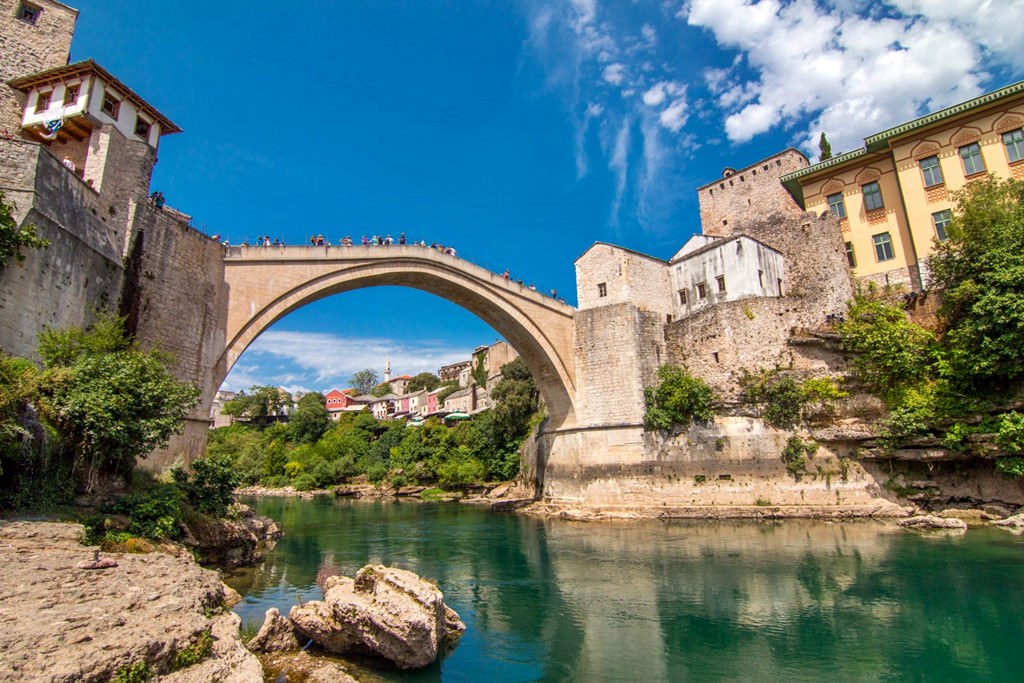National cuisine of Bosnia & Herzegovina for gourmets. Authentic recipes, delicacies and specialties
 Bosnia and Herzegovina is a country of cultural diversity. This can not but be reflected in the national cuisine, which combines the influence of Turkish, Mediterranean, Croatian, Greek, and Russian cuisines. Lunch in Bosnia and Herzegovina is considered more important than breakfast. Traditionally, locals have lunch at 2:00 PM and dine at 8:00 PM. It must be said that the food habits of Bosnians are as complex as the history of their country. An important role in preparing national dishes is played by locally produced vegetables, and special "Slivovitz" brandy is made from plums growing throughout the country.
Bosnia and Herzegovina is a country of cultural diversity. This can not but be reflected in the national cuisine, which combines the influence of Turkish, Mediterranean, Croatian, Greek, and Russian cuisines. Lunch in Bosnia and Herzegovina is considered more important than breakfast. Traditionally, locals have lunch at 2:00 PM and dine at 8:00 PM. It must be said that the food habits of Bosnians are as complex as the history of their country. An important role in preparing national dishes is played by locally produced vegetables, and special "Slivovitz" brandy is made from plums growing throughout the country.
1. Although Bosnians are not very punctual, they respect punctual foreigners. Therefore, it's advisable to arrive at meetings on time or with a little …
Read further
Read further
It would seem that there shouldn't be many places for family vacations in such a small country as Bosnia and Herzegovina. However, they are pretty …
Read further
Read further
 On holidays, Bosnian tables are groaning with all sorts of food. There is always much more food than guests can eat. One has to politely refuse to continue the meal several times, as local etiquette requires hosts to make sure that guest won't stay hungry. Since among Bosnians there are Muslims, Catholics, and Orthodox Christians, traditions may differ from family to family. By the way, it's customary to share holidays here, just like food. One of the favorite festive dishes is Sarma prepared from sauerkraut, minced meat, and rice with seasonings. These rolls are cooked in large pots on low heat. Paprika, lard, smoked pork, and bay leaves are necessarily added to them. Sarma often becomes the main dish on the New Year's or Christmas table, it is also prepared for weddings, birthdays, and Easter.
On holidays, Bosnian tables are groaning with all sorts of food. There is always much more food than guests can eat. One has to politely refuse to continue the meal several times, as local etiquette requires hosts to make sure that guest won't stay hungry. Since among Bosnians there are Muslims, Catholics, and Orthodox Christians, traditions may differ from family to family. By the way, it's customary to share holidays here, just like food. One of the favorite festive dishes is Sarma prepared from sauerkraut, minced meat, and rice with seasonings. These rolls are cooked in large pots on low heat. Paprika, lard, smoked pork, and bay leaves are necessarily added to them. Sarma often becomes the main dish on the New Year's or Christmas table, it is also prepared for weddings, birthdays, and Easter.
This article about national cuisine of Bosnia & Herzegovina is protected by the copyright law. You can re-use the content, but only under the condition of placement of an active link to www.orangesmile.com.
Fantastic City Tours and Excursions in Bosnia & Herzegovina
Expo 2020 in Dubai Was Visited by More Than 7 Million Visitors
If you haven’t visited this event yet, there is still time to book a hotel in Dubai because Expo 2020 Dubai runs until 31 March 2022. People who are unable to visit the emirate can make a virtual tour on the Expo 2020 website. By the way, the virtual visitation has already reached 31.6 million by the end of December. Read this
Read this
19.04.2024
If you haven’t visited this event yet, there is still time to book a hotel in Dubai because Expo 2020 Dubai runs until 31 March 2022. People who are unable to visit the emirate can make a virtual tour on the Expo 2020 website. By the way, the virtual visitation has already reached 31.6 million by the end of December.
19.04.2024
Sights of Bosnia & Herzegovina - photostream
Cuisine and restaurants in popular cities of Bosnia & Herzegovina
Meat dishes are commonly made of beef, however ethnic restaurants also serve excellent dishes made of lamb and pork. The meat is often stewed or cooked on an open fire. One of the most popular ethnic treats is the bosanski lonac being roast meat added with spice and cabbage. Meat dishes admirers will love local kebab which is an essential treat of any festive table. The table is commonly served with vegetable dishes among which simple salads made of fresh vegetables and added with olive oil are … Read more 
When it comes to meat delicacies, it is important to mention duvec – steamed beef with vegetables and rice, grilled meat, and pljeskavica – minced meat cutlets with vegetables and rice that are usually served with vegetable garnish. The choice of vegetable salads, ragouts, and soups is nothing but incredible. Moreover, every dining venue usually offers several signature salads. Food in Banja Luka not only tastes great but also looks appealing. There are very simple dishes and sophisticated … Read more 


 English
English Russian
Russian Nederlands
Nederlands Deutsch
Deutsch Español
Español Français
Français Türkçe
Türkçe





















